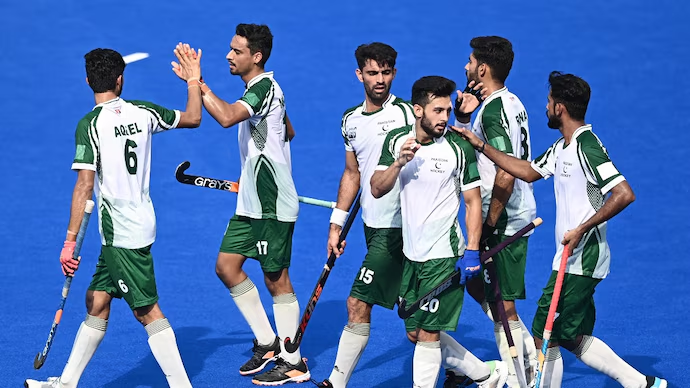The withdrawal of Pakistan’s men’s junior hockey team from the FIH Junior Hockey World Cup 2025, scheduled to be held in Chennai and Madurai from November 28 to December 10, has ignited a debate that extends far beyond sport.
Officially framed as a decision made for “safety reasons” amid a “volatile political climate,” Pakistan’s pullout is a stark reminder of how geopolitical tensions continue to shape international sports governance in South Asia. This marks the second withdrawal by Pakistan Hockey Federation (PHF) from an Indian-hosted hockey event in 2025, following its earlier absence from the Men’s Asia Cup in Rajgir. The consequences of this decision are both immediate and far-reaching from tournament restructuring to financial penalties and reputational damage for the PHF, alongside unexpected diplomatic relief for India.
The timing of the withdrawal, confirmed by the International Hockey Federation (FIH) on October 24, leaves just over five weeks before the tournament’s opening. Under FIH regulations, this qualifies as a late withdrawal, automatically triggering sanctions. The penalties are likely to include:
- •A financial fine of up to CHF 15,000 (approx. ₹14 lakh),
- •Forfeiture of deposits and compensation to Hockey India for quantifiable financial losses, and
- •A loss of world ranking points, equivalent to those awarded to the tournament’s last-placed team.
These are not symbolic penalties. A similar regulatory breach in 2019 saw PHF’s fine reduced after prolonged negotiation, but the episode reinforced the body’s reputation for poor compliance. With this latest withdrawal, PHF faces further scrutiny and the potential for suspension from future FIH events until all dues are cleared.
The Lost Fixture: India vs Pakistan
The most direct sporting consequence is the cancellation of the India–Pakistan match, which had been scheduled for November 29 in Chennai. Traditionally, the fixture is the tournament’s commercial and emotional highlight a match that transcends sport to draw record audiences, drive sponsorships, and elevate the event’s visibility.

Pakistan had qualified for the Junior World Cup on merit, finishing runner-up at the 2024 Junior Asia Cup in Muscat after losing 5–3 to India. They were drawn in Pool B alongside India, Chile, and Switzerland. Their withdrawal leaves a major scheduling void, prompting FIH to seek a replacement team, likely from within Asia.
Based on qualification rankings, South Korea, who finished 8th in the 2024 Junior Asia Cup, is the frontrunner to replace Pakistan. While this maintains the integrity of the 24-team format, it also dilutes the group’s competitiveness a shift that arguably makes India’s path to the knockout stages slightly easier.
The PHF’s official justification cited “security concerns” and the “current political situation,” emphasizing that a neutral venue should have been arranged. However, the underlying reason is clearly rooted in geopolitics. The timing of the withdrawal follows the April 2025 Pahalgram terror attack and India’s subsequent Operation Sindoor, which strained bilateral ties to their lowest point in years. The PHF’s move aligns with a broader pattern of politically guided sporting disengagement between the two countries.
Crucially, India’s government policy does not prohibit Pakistani participation in multi-nation events hosted on its soil only in bilateral series. Pakistan’s exit, therefore, was voluntary and politically driven, not a response to official exclusion.
Ironically, while Pakistan’s decision disrupts the event’s competitive structure, it spares India a potential diplomatic crisis. Had the PHF confirmed its participation, India’s government would have faced immense domestic pressure to deny visas amid heightened security tensions. Such an action would have constituted a direct breach of the Olympic Charter, which mandates non-discrimination in access for all competing nations. This is not theoretical India faced severe repercussions in 2019, when two Pakistani shooters were denied visas for the ISSF World Cup in New Delhi following the Pulwama attack.
The IOC responded immediately, stripping the event of its Olympic qualification quotas and suspending India from bidding for future events until written guarantees of compliance were provided. Given India’s ongoing campaign to host the 2036 Olympic Games, any repeat of that episode would have been catastrophic. Pakistan’s withdrawal, therefore, inadvertently protects India’s Olympic hosting ambitions, shifting the burden of non-compliance and sanction risk entirely onto the PHF.
Impact on Pakistan Hockey: A Generation Loses Out
The biggest casualty of this political maneuver is Pakistan’s young hockey talent. The Junior World Cup serves as the essential bridge between development and elite-level hockey, providing exposure to world-class systems and competition. Pakistan’s withdrawal means its emerging players will now miss an entire global cycle a loss that compounds an already fragile domestic ecosystem.
The PHF’s recent track record paints a worrying picture: financial mismanagement, poor infrastructure, and dwindling international participation. The 2025 Junior World Cup offered a rare chance to reset that narrative. Instead, the decision to withdraw reinforces Pakistan’s sporting isolation and jeopardizes its long-term competitiveness in world hockey.
For the FIH, the incident underscores a persistent structural challenge: balancing India’s reliability as a host with the unavoidable political volatility of the region. India offers world-class facilities, strong government backing, and financial sustainability qualities few nations can match. But the repeated pattern of Pakistan’s non-participation in India-hosted events now twice in one year creates a logistical nightmare for tournament planners. Each withdrawal forces last-minute replacements, financial recalculations, and a loss of global credibility for the event.
Analysts argue that the FIH must now formalize a geopolitical risk framework, pre-identifying replacement teams and contingency plans for high-risk nations. Without such proactive measures, every South Asian tournament risks being derailed by geopolitics.
Pakistan’s withdrawal from the 2025 FIH Junior Hockey World Cup is less a sporting choice and more a political default the result of a government-driven calculus that prioritizes optics and security narratives over athletic development. The immediate fallout includes sanctions, financial penalties, and ranking losses for the PHF. The long-term consequences are more damaging: diminished player exposure, weakened competitive credibility, and further isolation from the international hockey ecosystem.
For India, however, the outcome offers inadvertent strategic relief. By stepping back, Pakistan has ensured the World Cup proceeds smoothly, while shielding the host nation from the risk of Olympic Charter violations at a time when every international partnership counts. In essence, what began as a sporting withdrawal has evolved into a geopolitical buffer one that reveals how deeply intertwined sports, politics, and diplomacy remain in South Asia’s sporting future.
How useful was this post?
Click on a star to rate it!
Average rating 0 / 5. Vote count: 0
No votes so far! Be the first to rate this post.





